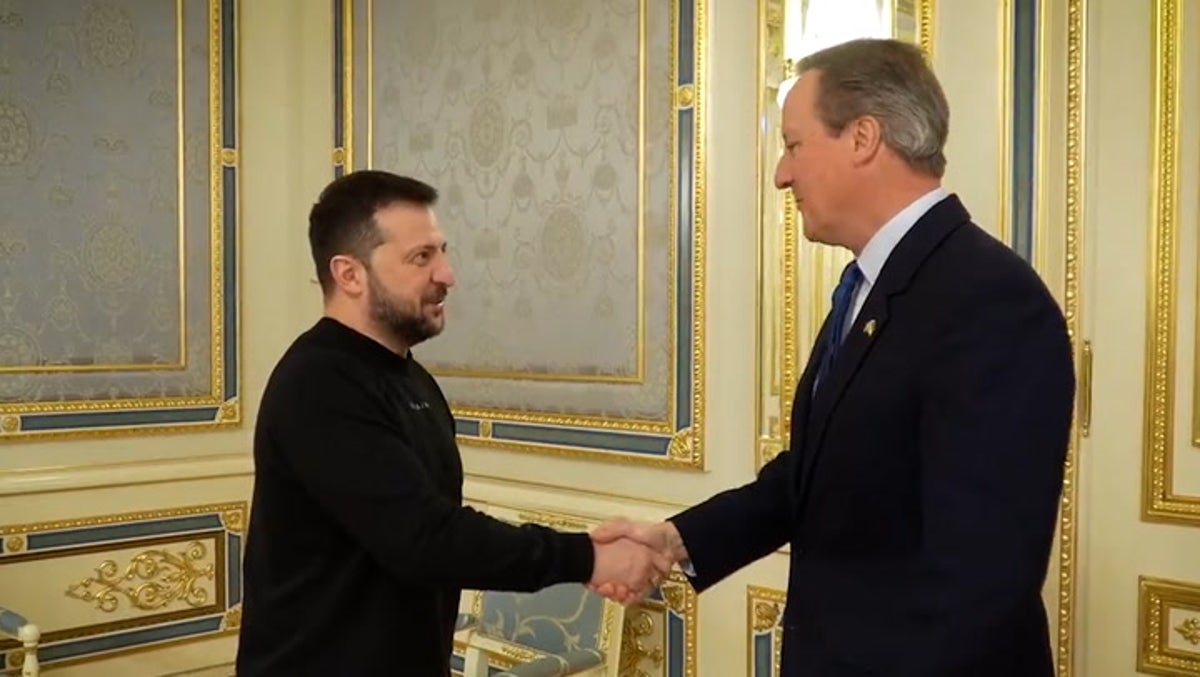
David Cameron has visited Volodymyr Zelensky in Ukraine in his first overseas trip as foreign secretary.
The former prime minister joked about his “disagreements” with Boris Johnson, but said support for the Ukrainian president was “the finest thing” his government did.
And Lord Cameron promised Britain would maintain “moral, diplomatic, economic and military support” to the war-torn country “for however long it takes”.
In a video of the meeting in Odesa, shared by president Zelensky, Mr Cameron said: “I had some disagreements with my friend Boris Johnson, and we have known each other for 40 years, and his support for you was the finest thing that he and his government did.”
The newly-appointed foreign secretary added: “I wanted this to be my first visit. Personally, I admire the strength and determination of the Ukrainian people.
“And what I want to say by being here is we will continue to give you the moral support, the diplomatic support the economic support, but above all the military support, not just this year and next year, but for however long it takes.”
Ukraine’s president said the pair discussed the supply of weapons for his forces fighting against the Russian invasion when they met in Kyiv.
Mr Zelensky said: “We had a good meeting focused on weapons for the frontline, strengthening air defence, and protecting our people and critical infrastructure. I am grateful to the UK for its support!”
Lord Cameron, the former prime minister, became foreign secretary on Monday and the early visit to Ukraine will be intended to demonstrate Britain’s continued support. His predecessor, James Cleverly, had been scheduled to make the visit before being moved to the Home Office in Monday’s reshuffle.
Mr Johnson, Lord Cameron’s long-time rival, was a steadfast supporter of Ukraine, striking up a close relationship with president Zelensky after Russia’s invasion.
Lord Cameron is the first British minister to travel to the Black Sea port city since the war began. It has come under fire since Russia declined to renew a grain export deal with Ukraine in August.
However, a new corridor in the Black Sea, close to the shoreline, has allowed 91 ships to export cargo. “In the last three months, Ukraine has made remarkable progress in the Black Sea to drive the Russian Navy eastwards and open critical export corridors for Ukraine’s economy and global food supplies,” Lord Cameron said.
Meanwhile, a campaigner and host for Ukrainian refugees has voiced concerns after a government minister declined to rule out visa fees for those who have fled to the UK amid the ongoing war. The first visas issued as part of the Homes for Ukraine scheme, launched last year following the Russian invasion, will expire in March 2025.
In a written response to a question in parliament, immigration minister Robert Jenrick said: “We keep the need for a possible extension of UK sanctuary, beyond March 2025, under consistent review. This includes whether to require a fee.”
Kitty Hamilton, co-founder of the advocacy group Vigil for Visas, has hosted a number of Ukrainian refugees, said: “They are not here because they want to be, they are here because there is a war in their country and they can't go back yet. It seems unfair to add to this insecurity with a lack of clarity on whether our guests can stay here in the UK.”
It came as Finland closed four crossing points on its long border with Russia to stop the flow of Middle Eastern and African migrants that it accuses Moscow of ushering to the border in recent months. Finnish authorities say Russia has started allowing undocumented travellers to access border zones and enter crossing points where they can request asylum in Finland.
Separately, Washington imposed sanctions on 10 individuals in the western Balkans in a bid to contain Russian influence there. They include Savo Cvijetinovic, a senior official of the political party led by Milorad Dodik, the pro-Russia leader of Republika Srpska (RS), the Serb-dominated half of Bosnia and Herzegovina.







